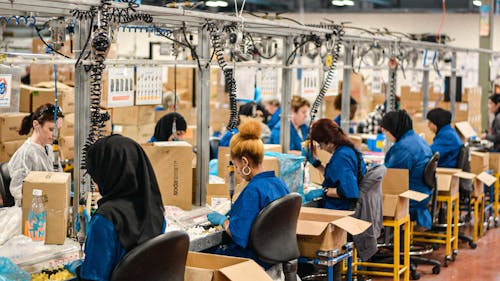SOHAIL: Be aware of how exploited labor supports your comfortable life
Column: Nohman's Nuances

Stop, take a moment and realize gross exploitation has created whatever electronic device you are using to read this article, some of the food you eat, the clothes you wear and maybe even the water you drink.
It is a bizarre phenomenon: Many of us are aware of the pain and suffering from the factories, farms and sweatshops used to produce our products. But rather than protesting at the source or even admonishing these practices, we continue to consume and compartmentalize the harsh truths to keep ourselves as happy as possible.
This compartmentalization of guilt is devastating. It inhibits any action to support the less fortunate, dehumanizes the laborers responsible for our comfort and demonstrates our significant lack of spatial intelligence. This is why — at the bare minimum — we should acknowledge the cruel labor that goes into each product we consume.
Chocolate is the most glaring example of an exploitative system we choose to tolerate. More than 80 percent of U.S. adults purchase some form of chocolate product yearly from mainstream companies, even though cocoa farming is consistently rebuked as modern slavery.
It would be detrimental to chocolate companies’ sales if all their consumers knew the physical and mental toll demanded by cocoa farming. For instance, most cocoa farmers work for salaries well below the global poverty line, and some have never even been able to try the products of their own labor.
Any person can walk into a convenience store and purchase a chocolate product for a price greater than the daily salary of the average cocoa farmer in Africa.
The main aspect that normalizes this atrocity to consumers is proximity. Outsourced labor produces a unique psychological effect where citizens of affluent countries can claim the system works as intended, keeping the less fortunate "out of sight, out of mind."
It is sobering to realize that the bar of chocolate you chose to purchase involved pain inflicted on a real person at some point along the supply chain. Thus, we as consumers blind ourselves with commodity fetishism, a concept in which we imbue value on the product and the exchanges used to obtain that product rather than the producers themselves.
Shifting the focus away from the laborers and onto the products themselves to forget sinister operations behind the scenes.
Chocolate, like most commodities, has become a status symbol and divides the world into two types of people: those with chocolate and those without.
But this type of exploitation is not limited to chocolate. The footwear industry is another glaring example of this mistreatment. Nike has been on a streak of countless controversies regarding their use of sweatshops. They routinely deny the accusations, but the evidence suggests otherwise.
An analysis by the Australian Strategic Policy Institute found that Nike was among 82 companies involved in a state-sponsored labor transfer scheme. In this scheme, Uyghurs, some of who were previously forced into detention camps in Xinjiang, were relocated to factories in which they were grossly underpaid.
Of course, this exploitation is not limited to just Nike. A comparative analysis of several Chinese factories found that almost no national regulations were being enforced among shoe brands.
Twelve hours of mandated work in a day — coupled with suggested overtime that is enforced through the threat of getting fired — helps maintain high output with low wages.
We are, of course, aware of the existence of sweatshops. Aware of the exploitative nature of these food and clothing companies and how little they pay their tired workers for grueling work. Yet, not only do we not rally against these human rights violations, but we also fail to acknowledge their existence.
A large-scale, cyclical bystander effect is the root cause of our inaction. The presence of other able-bodied people who can intervene but choose not to seemingly relieves the individual from having to take any action themselves.
Therefore, the first step in dismantling the horrors that gifted you a comfortable life is acknowledging that the horrors exist while still appreciating the farmers and factory workers who have no other choice.
So the next time you open your iPhone or eat a chocolate bar, I would at least like for you to envision the unfair situation that enabled you to enjoy these products.
Nohman Sohail is a first-year in the School of Arts and Sciences majoring in economics and political science. His column, "Nohman's Nuances," runs on alternate Thursdays.
*Columns, cartoons and letters do not necessarily reflect the views of the Targum Publishing Company or its staff.
YOUR VOICE | The Daily Targum welcomes submissions from all readers. Due to space limitations in our print newspaper, letters to the editor must not exceed 900 words. Guest columns and commentaries must be between 700 and 900 words. All authors must include their name, phone number, class year and college affiliation or department to be considered for publication. Please submit via email to oped@dailytargum.com by 4 p.m. to be considered for the following day’s publication. Columns, cartoons and letters do not necessarily reflect the views of the Targum Publishing Company or its staff.



